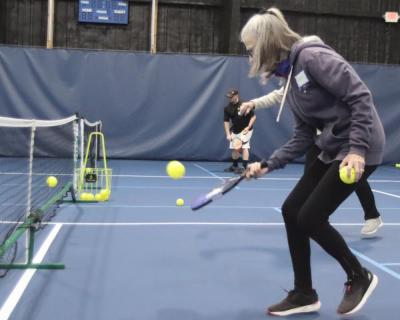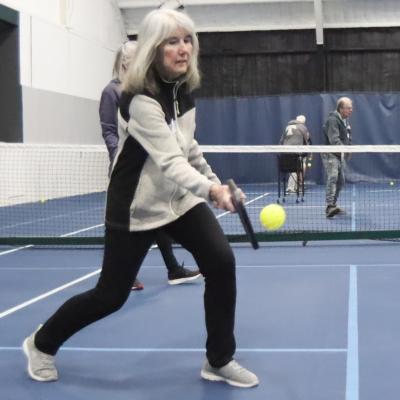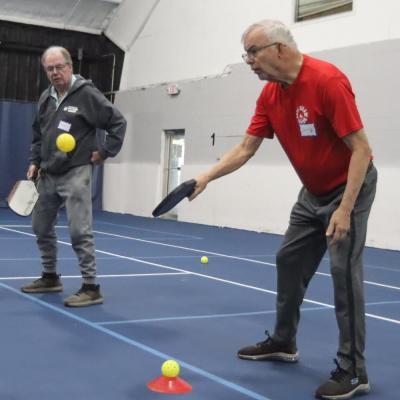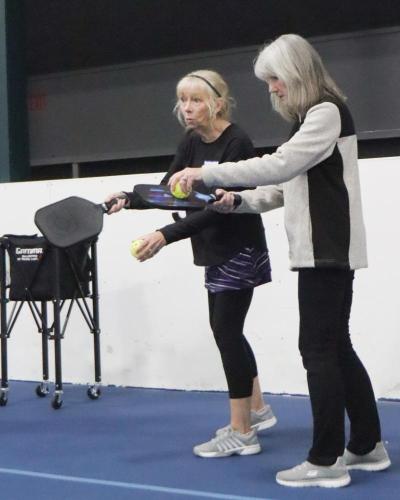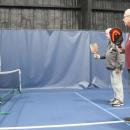Lakeville Athletic Club pilots Pickleball for Parkinson’s program
LAKEVILLE — While they may have trouble texting, writing, or buttoning up shirts, some of those with Parkinson’s have no trouble sending balls flying over a net. That’s what participants of the Pickleball for Parkinson’s Program have proved in a pilot program at Lakeville Athletic Club.
The club initiated a pilot program last week that uses pickleball as a way to help Parkinson’s patients combat motor skill loss, explained the club’s director, Richard Anthony.
“The objective is to have a safe, organized environment for people with Parkinson's to exercise, maintain and develop their motor skills that are being depleted,” said Anthony. And most importantly “to have a lot of fun, and meet people in a similar place.”
The pilot program features clinics that are designed to help players improve mobility, work on balance and engage in intense physical activity, said Anthony. Each session begins with a 15 minute warm-up led by Lakeville Athletic Club Trainer Brian Madden.
Following the warm-up, players do a drills and skills activity with instructors and the session finishes off with a modified play portion.
Parkinson’s disease is brain disorder that causes unintended or uncontrollable movements, such as shaking, stiffness, and difficulty with balance and coordination.
It occurs when nerve cells in the area of the brain that controls movement become impaired or die, as explained by the National Institute on Ageing. Most people develop the disease after the age of 60.
Once the pilot program is over, Anthony plans to expand to two sessions per week, one will serve as a continuation for players in the pilot program while the second will be for beginners.
His ultimate goal is to create a non-profit. “I’m in the process of creating a non-profit that will support this program through donations,” he said.
He was inspired to launch Pickleball for Parkinson’s after he heard about Rock Steady Boxing, a wellness program for people with Parkinson’s based on the foundation of non-contact boxing.
“I just thought it was a really good program,” he noted.
Anthony said the feedback he has received from players is that “they had a lot of fun.”
Connie Dicocco, a program participant who was diagnosed with Parkinson’s two years ago, shared that the most rewarding part of the experience has been “keeping the ball going back and forth. When you hit and somebody else hits it, it’s like: ‘Yeah, I did that.’ ”
The trickiest part for Kathy Collins, who’s had Parkinson’s for four years, is the dizziness that comes as a result of problems with balance. “I was getting light-headed,” she said.
Many of the pickleball players are members of Rock Steady Boxing, and do all kinds of sports to offset the effects of Parkinson's.
Some have been lifelong athletes.
Rita Piper, who is 80 and has lived with Parkinson's for 17 years, did “all kinds of sports” until she was diagnosed. She even coached tennis at Bishop Stang High School in Dartmouth, she revealed.
Pickleball and boxing are just two the many sports that Dicocco does to combat the symptoms of Parkinson’s. She also does yoga and golf.
“I do something every day to fight Parkinson’s,” she said. Now, she’s adding Pickleball to the list.




